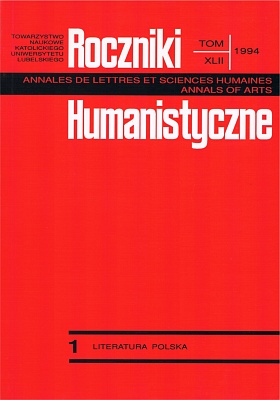Betsaba by E. Zegadłowicz in the Stagings of S. Wysocka
Abstract
The author deals with two stagings of Betsaba, a biblical drama in three acts written by Emil Zegadłowicz and put on by Town Theatre in Lublin (16 March 1927 -world premiere) and in New Theatre in Poznań (18 May 1927) directed and staged by S. Wysocka. In the beginning the author recalls earlier productions of Zegadłowicz's dramas: Olive Lamp − J. Słowacki's Theatre in Cracow, 31 May 1924, Acesta (in the same theatre) 7 March 1925, Border Rock − New Theatre in Poznań, 11 September 1925. Thus Betsaba was the fourth production of E.Zegadłowicz's drama staged by S. Wysocka.
Both performances of the latter are characterized by the same staging principles with some minute modifications. The first direction was its rapsodic character − pietism (exaggerated − according to some critics) for a poetic word, the second − the character of misterium. Zegadłowicz interpreted king David's love to Bethsheba, Uriah's wife, as a chain in the Divine plan of Incarnation of the Eternal Word and in the plan of Salvation. The stage-manageress sought to emphasize this thought both in composing the conceptions of the leading figures and in the Epilogue in which there appears the vision of the hut in Bethlehem. Wysocka's staging tended to limit the stage movement. A gesture would take on a particular meaning, especially in the Poznań production in which Wysocka had at her disposal such a talented and exceptionally „sculptory-minded” artist as Irena Solska. Furthermore the Lublin production was characterized by monumentalism, stressed by „living images” which close particular acts of the drama. The general evaluation of both productions was varied: reserved in Lublin, though „Betsaba” was perfomed ten times, and enthusiastic in Poznań with a total number of seven performances.
Copyright (c) 1994 Roczniki Humanistyczne

This work is licensed under a Creative Commons Attribution-NonCommercial-NoDerivatives 4.0 International License.





